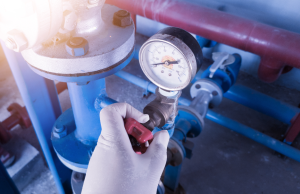How Do Water Softeners Help Maintain Water Pressure? Insights from a Pentair Water Softening Company in Lemont, Illinois

Hard water is characterized by excess amounts of calcium and magnesium. When water contains these minerals in excess amounts, there are several negative effects that can take place. One such effect is the gradual reduction of water pressure.
Are you wondering how hard water can impact your water pressure? Interested in learning how a water softener can help you avoid this issue? This Pentair water softening company in Lemont, Illinois is going to explain below.
How Does Hard Water Affect Water Pressure?
First, let’s discuss how hard water affects water pressure. It has to do with the water pipes. When hard water runs through water pipes, some of the calcium and magnesium in it gets left behind, clinging to the interior walls of these pipes.
Over time, these minerals build up on top of one another. As they build up, the pipe becomes narrower. The narrower the pipe becomes, the less room there is for water to flow. As a result, the water pressure gradually reduces.
At some point, this problem can become so severe that water flow ceases entirely. The water pipe can become entirely blocked, thereby restricting water pressure. If it gets to this point, you’ll need to replace the entire pipe. Replacing a home’s entire system of water pipes is typically an expensive endeavor, to say the least.
The better option is to preserve your water pipes now so that you don’t have to replace them in the future. You’ll also get to maintain your existing water pressure as an added benefit.
How can you do this? By having a system installed by your local Pentair water softening company in Lemont, Illinois. A water softener will remove the calcium and magnesium from your water supply, thereby preventing any chance of pipe buildup occurring.
How Does the Water Softener Remove Calcium and Magnesium from a Water Supply?
We’ve explained how hard water can slowly reduce water pressure. We’ve also talked about the importance of the water softener in maintaining proper water pressure. Now, let’s talk about how the water softener goes about removing calcium and magnesium from a water supply.
Water softeners make use of a process called ion exchange. This is when positive ions are traded for negative ions. In the water softener’s case, sodium ions are traded for calcium and magnesium ions. This is facilitated by a set of resin beads located within the water softener’s tank.
These resin beads store sodium ions. Then, when hard water comes rushing through, these sodium ions leave the beads, creating space for calcium and magnesium ions to cling to them instead. By the time the water has left the water softener, it’s entirely free of calcium and magnesium, and contains just miniscule amounts of sodium. In essence, it’s considered ‘soft’.
Because the water no longer contains calcium and magnesium ions, it’s no longer a danger to water pipes. It won’t cause buildup, which means your pipes will remain safe and functional.
All that’s needed to keep a water softener running is a refill of softener salt every one to two months — or as recommended by your Pentair water softening company in Lemont, Illinois. If you fill your water softener regularly, you won’t have to worry about pipe buildup ever again.
Looking for a Pentair Water Softening Company in Lemont, Illinois?
As you can tell, water softeners are vital to keeping your water pressure strong in the Lemont area. A water softener will help keep your pipes clear, which will protect your pipes and allow for optimal water flow.
Are you ready to have a water softener installed? Looking for the best Pentair water softening company in Lemont, Illinois? If so, Johnson Water Conditioning is the top choice. Contact us today to request a free estimate.

 Better Water for
a Better Life
Better Water for
a Better Life
